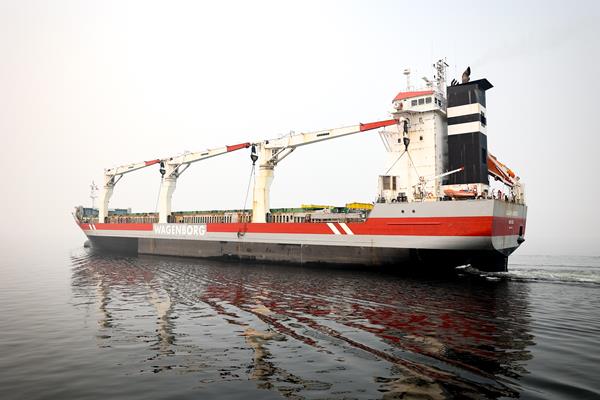For the first time in over two decades, an export shipment of Critical Minerals departed on August 16 from the Port of Churchill. The zinc concentrate shipment marks a significant milestone in Arctic Gateway Group’s work to revitalize the Hudson Bay Railway, diversify the Port of Churchill, and seize the opportunity to further develop Canada’s Arctic trade corridor to global markets.
“We’re building a new era of economic development and international trade for northern Manitoba while strongly supporting the principles of Indigenous reconciliation,” said Mike Spence, Chair of Arctic Gateway Group (AGG) and Mayor of Churchill. “Thanks to the strong partnership that we have developed between the Indigenous and northern ownership group, the Government of Canada, and the Province of Manitoba, we’ve been able to improve the reliability of our operations and secure new contracts to export Canada’s critical minerals to international markets.”
Mr. Spence added, “This shipment shows the strength of Manitoba’s resources and the opportunity of our deepwater Port and arctic trade corridor – we’re exporting critical minerals mined in Manitoba through a Manitoba port using infrastructure built by Manitobans.”
Over the past two months, more than one hundred rail cars of zinc concentrate from Hudbay Minerals Inc. (Hudbay) operations in Snow Lake, Manitoba were delivered to the Port of Churchill. The zinc concentrate was then stored temporarily at a recently built storage facility, which is the first new building at the port in over twenty years. This new storage facility is the first step in a broader plan to significantly increase critical minerals storage capacity at the Port of Churchill.
“The collaborative work done between all levels of government and the leadership of the Arctic Gateway Group has paved the way for this historic day,” said Dan Vandal, Minister of Northern Affairs and Minister responsible for PrairiesCan. “With a revitalized Hudson Bay Railway and Port of Churchill, jobs will be created, mining and forestry opportunities will open, and Bayline communities will have the opportunity to position themselves as a true gateway to the Arctic and the world.”
“This export activity through Churchill is proof that our investment in the transportation system is bringing a wave of growth and renewal for the north, and advancing economic reconciliation for Indigenous peoples,” said Lisa Naylor, Minister of Transportation and Infrastructure for the Province of Manitoba.
“Hudbay has a long history of mining in Manitoba and is committed to supporting the northern economy. The Port of Churchill provides us with an efficient gateway to deliver our products to global customers. We hope to build on this initial concentrate shipment to explore other mutually beneficial opportunities with Arctic Gateway Group in the future,” said Rob Carter, Vice President of Hudbay’s Manitoba Business Unit.
Alongside work to improve and diversify the Port of Churchill, AGG has made historic investments in capital upgrades along the Hudson Bay Rail Line that help to ensure the stability and reliability of freight and passenger services. This year’s construction season includes:
- replacement of 125,000 rail ties
- 800,000 feet of resurfacing
- several crossing rehabilitations
- turnout replacements
- various bridge improvements, including the replacement of a large rail bridge at Mile 179.8 of the Thicket Portage Sub-Division.
In addition to the mid-August critical minerals export shipment, the Port of Churchill also loaded a second vessel of essential northern resupply items in mid-July, including construction equipment, vehicles, and an array goods for the people and businesses in the Arctic.
With a $60 million investment by the federal and provincial governments in 2024, this construction season AGG is set to complete major capital upgrades on the Hudson Bay Railway, purchase essential port handling equipment, and lay the groundwork for future growth and port developments. These investments are made possible through the shared vision for a reliable, efficient, and financially profitable Arctic trade corridor, supported by the Government of Manitoba, the Government of Canada, and the Arctic Gateway Group. AGG looks forward to continuing this partnership as it progresses to the next phase of development.
When fully realized in 2028, the potential benefits of the Arctic Gateway port and railway are expected to:
- Reduce shipping time and costs for key international markets and more competitively priced imports and exports.
- Generate over $1 Billion annually in associated economic activity for the Canadian economy.
- Support over 5,500 jobs annually, including indirect jobs in associated industries such as construction and transportation.
- Be a model for economic reconciliation, which is a key focus of AGG’s unique ownership group of Indigenous and northern communities.
- Provide Canada with multi-use infrastructure that enables a stronger assertion of Canada’s sovereignty in the Arctic.
- Give Canadian imports and exports an alternate deep sea arctic port that is accessible by rail, strengthening Canada’s supply chain.
- Reduce costs of resupply shipments to arctic communities and increase food security.
(Photo from Arctic Gateway Group)








